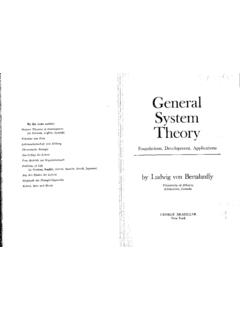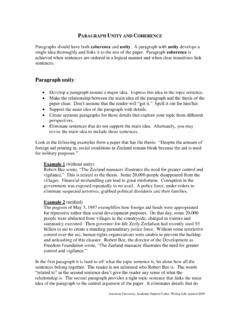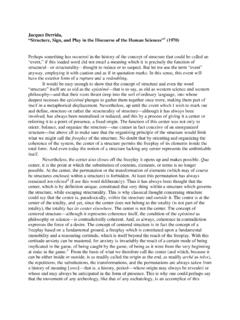Transcription of Foucault Michel Madness and Civilization: A History of ...
1 M D -" N E s s CIVILIZATION History IN THE ACE M I TY AS 0 M "Superb scholarship rendered with artistry." - The Nation Also by Michel Foucault The Order of Things: An Archaeology of the Human Sciences The Archaeology of Knowledge (and The Discourse on Language) The Birth of the Clinic: An Archaeology of Medical Perceptio!l I, Pierre Riviere, having slaughtered my mother, my sister, and my brother .. A Case of Parricide in the Nineteenth Century Discipline and Punish: The Birth of the Prison The History of Sexuality, Volumes 1, 2 and 3 Herculine Barbin, Being the Recently Discovered Memoirs of a Nineteenth-Century French Hermaphrodite Power/Knowledge: Selected Interviews and Other Writings, 1972-1977 The Foucault Reader (edited by Paul Rabinow) Translated from the French by RICHARD HOWARD Vintage Books A DIVISION OF RANDOM HOUSE New York, UtCAD.
2 A( SS AND CIVILIZATION J History of Insanity in the Jge of ~ason Michel Foucault ~~ ~~ VINTAGE BOOKS EDITION, NOVEMBER 1988 Copyright 1965 by Random House, Inc. All rights reserved under International and Pan-American Copyright Conventions. Published in the United States by Random House, Inc., New York, and simultaneously in Canada by Random House of Canada Limited, Toronto. Originally published in the United States by Pantheon Books, in 1965, and in France as Histt1ire de la Folie 1961, by Librairie Pion. This translation is of the edition abridged by the author and published in the Pion w/18 series.)
3 However, the author has added some additional material from the original edition, including the chapter "Passion and Delirium." Library of Congress Cataloging in Publication Data Foucault , Michel . Madness and civilization. Translation of Folie et deraison; histoire de la folie. Includes bibliographical references. 1. Psychiatry- History . z. Mental illness. I. Title. 1973 157'.1'09033 71-w581 ISBN o-679-7rno-x (pbk.) Manufactured in the United States of America 13579086420 INTRODUCTION Michel Foucault has achieved something truly creative in this book on the History of Madness during the so-called classical age: the end of the sixteenth and the seventeenth and eighteenth centuries.
4 Rather than to review histori-cally the concept of Madness , the author has chosen to re-create, mostly from original documents, mental illness, folly, and unreason as they must have existed in their time, place, and proper social perspective. In a sense, he has tried to re-create the negative part of the concept, that which has disappeared under the retroactive influence of present-day ideas and the passage of time. Too many historical books about psychic disorders look at the past in the light of the present; they single out only what has positive and direct relevance to present-day psychiatry.
5 This book be-longs to the few which demonstrate how skillful, sensitive scholarship uses History to enrich, deepen, and reveal new avenues for thought and investigation. No oversimplifications, no black-and-white statements, no sweeping generalizations are ever allowed in this book; folly is brought back to life as a complex social phenome-non, part and parcel of the human condition. Most of the time, for the sake of clarity, we examine Madness through one of its facets; as M. Foucault animates one facet of. the problem after the other, he always keeps them related to each other. The end of the Middle Ages emphasized the comic, but just as often the tragic aspect of Madness , as in Tristan and lseult, for example.
6 The Renaissance, with ( 'U) JNTRODVCTION Erasmus's Praise of F oily, demonstrated how fascinating imagination and some of its vagaries were to the thinkers of that day. The French Revolution, Pinel, and Tul<e empha-sized political, legal, medical, or religious aspects of mad-ness; and today, our so-called objective medical approach, in spite of the benefits that it has brought to the mentally ill, continues to look at only one side of the picture. Folly is so human that it has common roots with poetry and trag-edy; it is revealed as much in the insane asylum as in the writings of a Cervantes or a Shakespeare, or in the deep psychological insights and cries of revolt of a Nietzsche.
7 Correctly or incorrectly, the author feels that Freud's death instinct also stems from the tragic elements which led men of all epochs to worship, laugh at, and dread folly simultaneously. Fascinating as Renaissance men found it-they painted it, praised it, sang about it-it also heralded for them death of the body by picturing death of the mind. Nothing is more illuminating than to follow with M. Foucault the many threads which are woven in this com-plex book, whether it speaks of changing symptoms, com-mitment procedures, or treatment. For example: he sees a definite connection between some of the attitudes ,toward Madness and the disappearance, between 1200 and 1400, of leprosy.
8 In the middle of the twelfth century, France had more than 2,000 leprosariums, and England and Scot-land 2 20 for a population of a million and a half people. As leprosy vanished, in part because of segregation, a void was created and the moral values attached to the leper had to find another scapegoat. Mental illness and un-reason attracted that stigma to themselves, but even this was neither complete, simple, nor immediate. Renaissance men developed a delightful, yet horrible way of dealing with their mad denizens: they were put on a ship and entrusted to mariners because folly, water, and sea, as everyone then "knew,".
9 Had an affinity for each ( 'U;) Introduction other. Thus, "Ships of Fools" crisscrossed the seas and canals of Europe with their comic and pathetic cargo of souls. Some of them found pleasure and even a cure in the changing surroundings, in the isolation of being cast off, while others withdrew further, became worse, or died alone and away from their families. The cities and villages which had thus rid themselves of their crazed and crazy, could now take pleasure in watching the exciting sideshow when a ship full of foreign lunatics would dock at their harbors. The seventeenth and eighteenth centuries saw much social unrest and economic depression, which they tried to solve by imprisoning the indigents with the crimi-nals and forcing them to work.
10 The demented fitted quite natQrally between those two extremes of social maladjust-ment and iniquity. A nice and hallowed tradition has labeled Tuke and Pinel as the saviors of the mentally ill, hut the truth of the matter is not so simple. Many others had treated them with kind-ness, pleading that they belonged first and foremost with their families, and for at least two hundred years before. the 17 Sos, legislation had been considered or passed to segregate criminals and indigents from fools. But this legis-lation was prompted, as often as not, by a desire to protect the poor, the criminal, the man imprisoned for debts, and the juvenile delinquent from the frightening bestiality of the madman.













